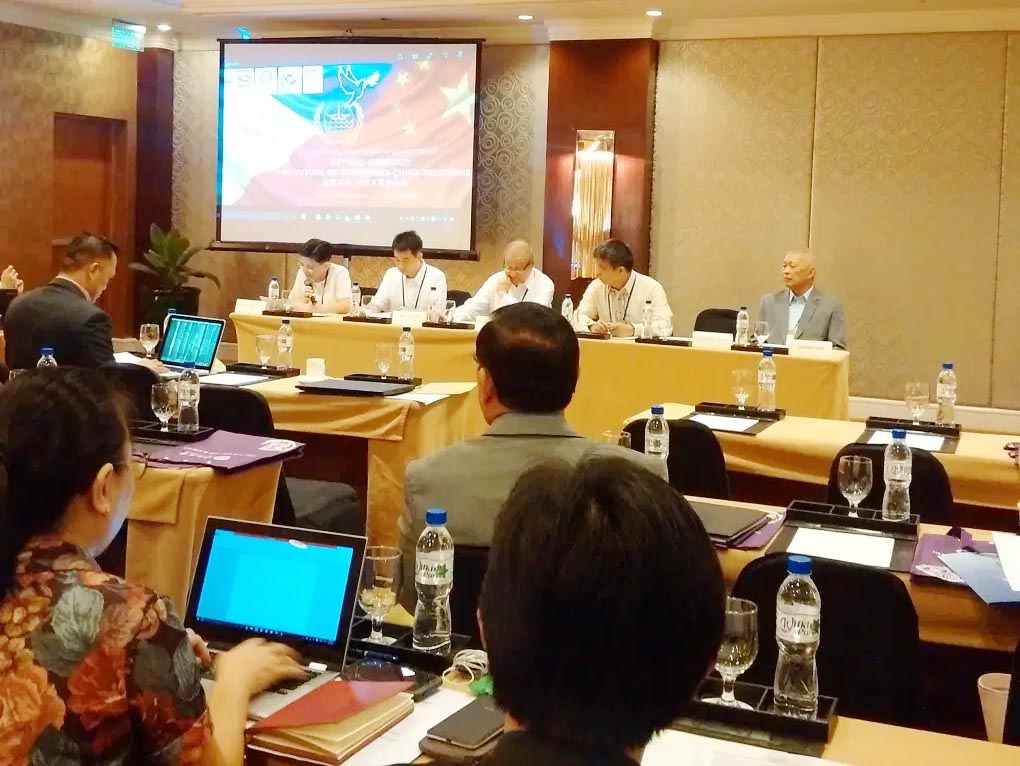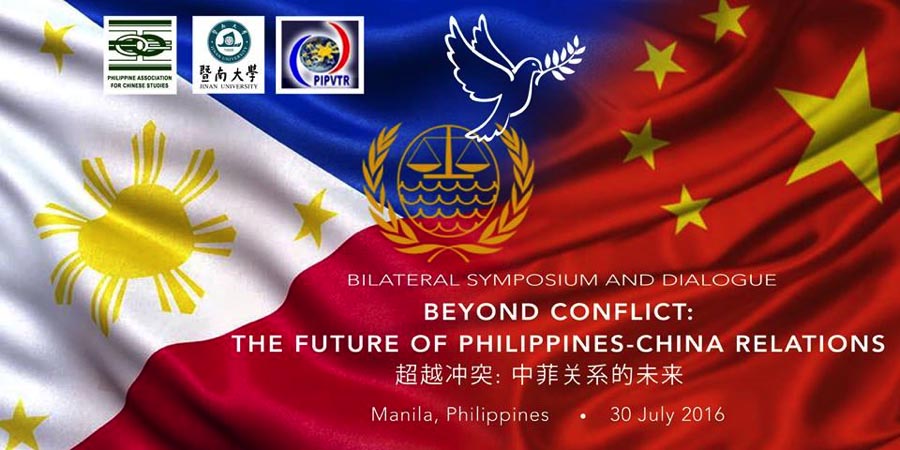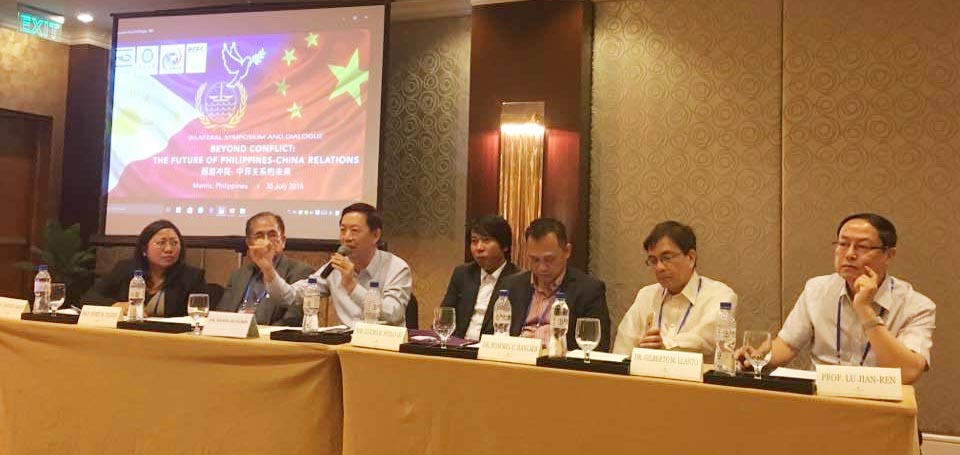There is no doubt that the South China Sea conflict is a major factor that defines the current state and future direction of Philippines-China relations.
But Philippines-China relations are wide-ranging and far-reaching. Beyond the South China Sea conflict are many other areas where the Philippines and China can cooperate rather than compete.
These areas were the focus of the bilateral symposium and dialogue held on July 30 at Edsa Shangri-la Hotel.
Entitled “Beyond Conflict: The Future of Philippines-China Relations,” the main purpose of the symposium was to discuss other aspects of Philippines-China relations beyond the South China Sea conflict. The Center for Philippine Studies and Institute of Southeast Asian Studies of Jinan University in Guangzhou organized this academic event in cooperation with the Philippine Association for Chinese Studies, Philippines-China Friendship Club and the Philippine Institute for Peace, Violence and Terrorism Research.
The symposium, composed of four panels, grappled with the various facets of Philippines-China relations ignored by local and international media at the height of the arbitration case filed by the Philippines against China filed in January 2013. It was held just two weeks after the Permanent Court of Arbitration announced its verdict on July 12 in favor of the Philippines.
Understanding Sino-PH relations
This panel of four speakers and a discussant, moderated by Daisy See of Ateneo de Manila University, presented the broader overview of Philippines-China relations.
The first speaker, Chito Sta. Romana, PACS president, talked about the prospects and challenges in Philippines-China relations, particularly in the post-arbitration period. He argued that while China rejected the result of the international arbitration, there are prospects for cooperation between the Philippines and China because of Beijing’s position in promoting joint development in the South China Sea to achieve a win-win solution to the maritime conflict.

The second speaker, Dr. Dai Fan of Jinan University, described the Philippine foreign and security policies and its implications for Philippines-China relations. He highlighted the golden age of Philippines-China relations under former president Gloria Macapagal-Arroyo and the deterioration of bilateral ties under former president Benigno Aquino III. He took note of positive signals from President Duterte who could usher in a new era in Philippines-China relations.
The third speaker, Dr. Ellen Palanca of the Ateneo de Manila University, discussed the economic context of Philippines-China relations. She stressed that with the exception of development assistance, the two countries’ economic ties (trade, investment, tourism) were affected more by economic factors than political factors like the South China Sea dispute.
The fourth speaker, Dr. Jay Batungbacal of the University of the Philippines College of Law, discussed the post-arbitration challenges in Philippines-China relations. He argued that the result of the international arbitration could affect the relations between the two countries, particularly on fishing activities and energy development in the South China Sea.
Retired general Victor Corpuz, the discussant, proposed a win-win solution to the South China Sea dispute by encouraging direct bilateral talks with China.
Prospects for bilateral cooperation
This panel’s four speakers and two discussants, moderated by Prof. Charithie Joaquin of the National Defense College of the Philippines, identified areas where the Philippines and China can cooperate constructively and productively for mutual benefit.
The first speaker, Dr. Lu Jianren of Guangxi University of Nationalities, explained China’s One Belt-One Road initiative and the opportunities it could bring to promote closer Philippines-China economic ties. He expressed hopes that President Duterte will take advantage of these opportunities to improve Philippines-China relations.
The second speaker, Dr. Gilberto Llanto of the Philippine Institute for Development Studies, introduced prospects for investment and infrastructure cooperation between the Philippines and China. He said the China-led Asian Infrastructure Investment Bank could provide the Philippines financing options for infrastructure requirements.

This writer was the third speaker. I stressed that countering terrorism initiatives could encourage Philippines-China cooperation.
Both China and the Philippines suffer from terrorist attacks emanating from violent extremist groups. China experiences terrorist problems in Xinjiang Uyghur Autonomous Region while the Philippines faces terrorist threats in the Autonomous Region in Muslim Mindanao.
Both countries can share their experiences in countering terrorism and promote bilateral cooperation to combat terrorist threats.
The fourth speaker, Lucio Pitlo III of De La Salle University, discussed China-ASEAN maritime connectivity through the China-led Maritime Silk Road Initiative.
He expressed disappointment that the Philippines’ role in the MSRI was not yet clarified and maximized. But he stressed that MSRI was one area where the Philippines and China could promote economic cooperation.
Prof. Bobby Tuazon of the Center for People Empowerment and Governance served as one of the discussants. He lamented the pro-American position of former president Aquino. But he is seeing signs of improvements in Philippines-China relations under President Duterte.
Another discussant was Wilson Lee Flores, a columnist from The Philippine Star. He shared the perspectives of Prof. Tuazon and emphasized the need to repair relations with China to advance Philippine national interests. He expressed hope that President Duterte could do this.
China-Philippines conflict management
This panel had four speakers and one discussant and was moderated by Dr. Joefe Santarita of UP Asian Center. It looked at how different players dealt with or failed to effectively address the tensions.
The first speaker, Dr. Aaron Rabena of the PCFC, explained that tensions were greatly influenced by strategic perceptions and misperceptions leading to mutual accusations and name-calling.
He strongly recommended altering the confrontational and mutually distrustful mindset to manage tensions and improve bilateral ties.
Dr. Ju Hailong’s (of Jinan University) paper, “Orientation of the Philippines’ New Government on South China Sea Policy and Outlook Towards Prospects of Sino-RP Relations,” was presented on his behalf by Dr. Dai Fan. The author said the future direction of Philippines-China relations would largely depend on the future decisions of President Duterte.
The third speaker, Dr. Aileen Baviera of the U.P. Asian Center, shared this perspective. She, however, stressed that the strategic choices of President Duterte would depend on the realities of major power politics and regional security dynamics.
Dean Melito Salazar Jr. of Centro Escolar University focused his presentation on media’s role in conflict resolution.
He cited the media’s strong influence in its ability to inform, educate and even entertain societies.
Media could also change perceptions that could contribute to the peaceful management of Philippines-China territorial and maritime conflicts in the South China Sea.
In her discussion, Dr. Clarita Carlos of the UP Political Science Department agreed with the presentation of Rabena and Salazar. She also commended Dr. Baviera for analyzing the issue in its proper strategic contexts.
But she emphasized the value of functional cooperation to promote Philippines-China relations and the resolution of their conflicts in the South China Sea.
PH-China cultural exchange and interactions
The last panel, moderated by Dr. Tina Clemente of the U.P. Asian Center, had four speakers and one discussant, all of whom are younger than the previous panelists.
The first speaker, Dr. You Hong Bo of Sun Yat Sen University in Guangzhou, discussed media diplomacy and Philippines-China relations.
He described how media from both countries reported the situation in the South China Sea and how these adversely affected bilateral ties. He called for more accurate reporting to help ease tensions and improve ties.

The second speaker, Meah Ang See of Kaisa Para Sa Kaunlaran and De La Sale University, discussed the identity formation and changes that have happened in the Tsinoy community.
She presented the results of a survey that indicated that majority of the Tsinoys stand by the Philippines in the maritime disputes between China and the Philippines.
She stressed that through long years of socio-cultural evolution, the Tsinoys’ new norms and forms of cultural heritage eventually became an accepted component of Philippine national culture. Thus, the Tsinoy community could become an effective bridge in Philippines-China relations.
The third speaker, Ivy Ganadillo of the UP Asian Center, talked about new Chinese migrants in the midst of the South China Sea conflict. She stressed that Philippines-China relations did not evolve only in the South China Sea, that people-to-people contacts and economic relations formed large portions of their bilateral ties.
She discussed the nature of old and new Chinese migrants in the Philippines and that new Chinese migrants in the country could offer many opportunities for the improvement and strengthening of Philippines-China relations.
Austin Ong, founding president of PCFC, shared about the positive role of Filipino students in China in the promotion of friendly relations between the two countries. He contended that Filipino students in China did not only strengthen people-to-people contacts but also facilitated mutual understanding between the two countries.
Dr. Liang Guanghan of the Confucius Institute, the discussant of this panel, lamented that the South China Sea dispute severely affected the political relations between the Philippines and China. But she highlighted many achievements in the area of cultural relations that should be strengthened to improve the countries’ overall bilateral ties.
Chito Sta. Romana provided the general synthesis of the symposium. He commended the quality of all the presentations and audience response.
He reaffirmed the symposium’s theme: that beyond the South China Sea conflict, there are many areas where the Philippines and China can cooperate for mutual benefits. — First published in Tulay Fortnightly, Chinese-Filipino Digest 29, no. 9 (October 4-17, 2016): 8-9.